|
Author
|
Topic: My personal Apollo story (Dan Schaiewitz)
|
Daniel on the Moon
Member Posts: 354
From: Bronxville, NY
Registered: Jun 2015
|
 posted 08-02-2016 12:05 AM
posted 08-02-2016 12:05 AM
   
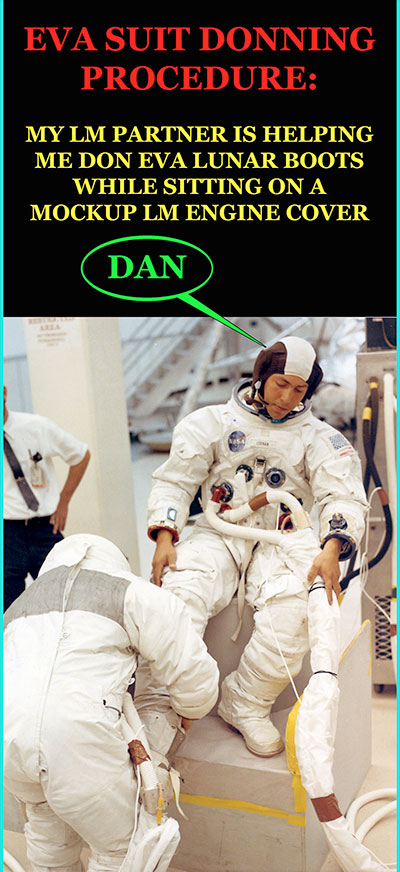 |
Daniel on the Moon
Member Posts: 354
From: Bronxville, NY
Registered: Jun 2015
|
 posted 08-02-2016 12:09 AM
posted 08-02-2016 12:09 AM
   
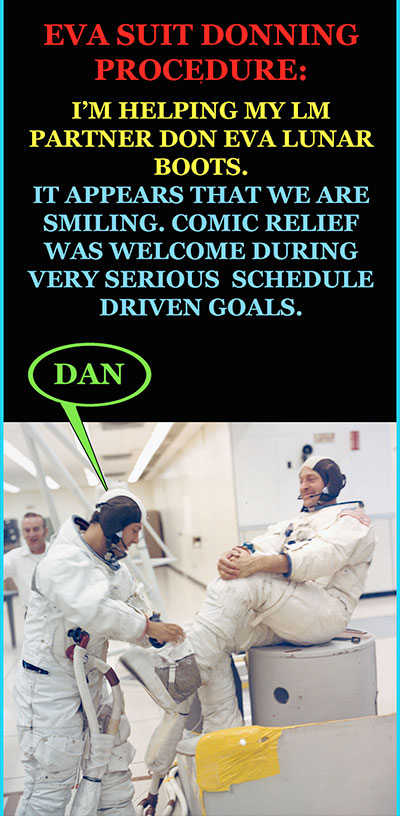 |
Daniel on the Moon
Member Posts: 354
From: Bronxville, NY
Registered: Jun 2015
|
 posted 08-03-2016 10:13 PM
posted 08-03-2016 10:13 PM
   
One of the most memorable days during my Apollo journey was the day I was asked if I wanted to be a "suit subject." Was there any doubt what my answer would be!There was, however, one requirement before I was officially given the title of "suit subject". I had to attend a class called "Physiological Aerospace Training Outline" (cover below) that included the topics in Figure 2 below. 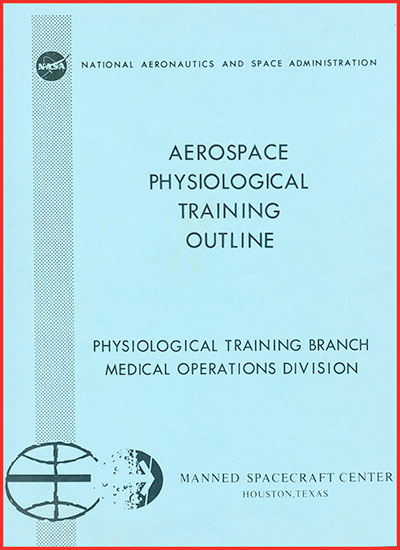 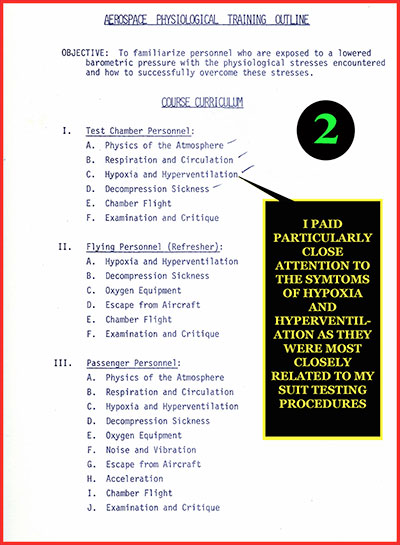
|
Daniel on the Moon
Member Posts: 354
From: Bronxville, NY
Registered: Jun 2015
|
 posted 08-03-2016 10:17 PM
posted 08-03-2016 10:17 PM
   
What were my thoughts after the course and just before suiting up for the first time (see below):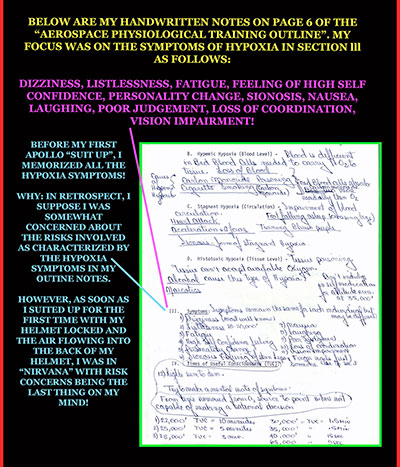 |
ejectr
Member Posts: 2025
From: Killingly, CT
Registered: Mar 2002
|
 posted 08-04-2016 11:36 AM
posted 08-04-2016 11:36 AM
   
Looks like you're left handed from your writing, Dan. |
Daniel on the Moon
Member Posts: 354
From: Bronxville, NY
Registered: Jun 2015
|
 posted 08-04-2016 07:57 PM
posted 08-04-2016 07:57 PM
   
I've been told that my writing is consistent with a "left hander", however, I'm right handed and I write with my right hand. |
Daniel on the Moon
Member Posts: 354
From: Bronxville, NY
Registered: Jun 2015
|
 posted 08-04-2016 11:12 PM
posted 08-04-2016 11:12 PM
   
I received the below letter from Apollo 16 Astronaut Charlie Duke authenticating two charms that I gave the crew to be flown to the moon and back in the astronauts Personal Preference Kit" (PPK).I was most impressed with Charlie's inspirational last sentence quote from Descartes: There is nothing so far removed from us that we cannot reach it, or so hidden that we cannot discover it. 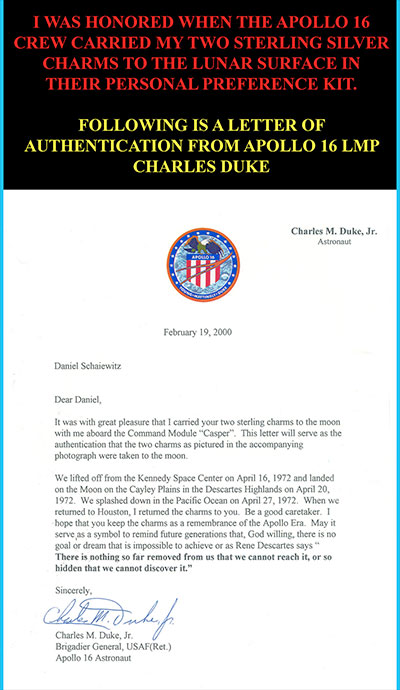 |
DG27
Member Posts: 271
From: USA
Registered: Nov 2010
|
 posted 08-05-2016 12:04 AM
posted 08-05-2016 12:04 AM
   
WOW! That is very cool. |
Daniel on the Moon
Member Posts: 354
From: Bronxville, NY
Registered: Jun 2015
|
 posted 08-05-2016 11:13 PM
posted 08-05-2016 11:13 PM
   
Cherished sentiments from Astronaut Cernan.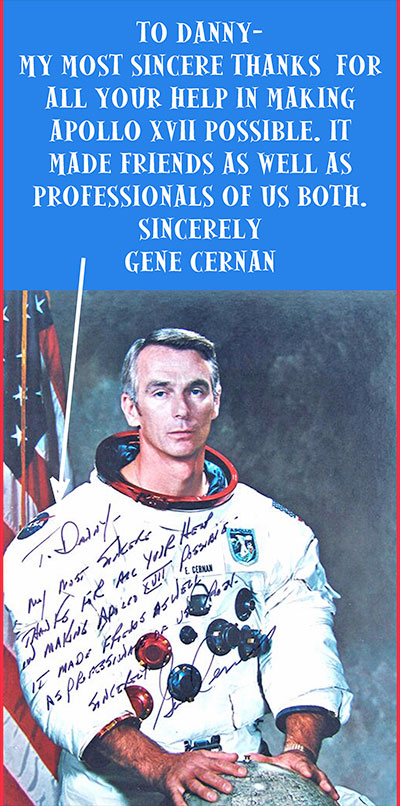 |
MCroft04
Member Posts: 1861
From: Smithfield, Me, USA
Registered: Mar 2005
|
 posted 08-06-2016 07:41 AM
posted 08-06-2016 07:41 AM
   
Dan, every time you post one of these photos I fear that it may be the last one. And then you post another great photo. I hope you have many boxes and they are all full! Thank you very much for sharing your history and knowledge with us! |
LM-12
Member Posts: 4021
From: Ontario, Canada
Registered: Oct 2010
|
 posted 08-06-2016 12:48 PM
posted 08-06-2016 12:48 PM
  
Which MOCR console in Houston monitored the EMU during the moonwalks, and who was on that console for the Apollo 11 EVA? |
Daniel on the Moon
Member Posts: 354
From: Bronxville, NY
Registered: Jun 2015
|
 posted 08-06-2016 01:13 PM
posted 08-06-2016 01:13 PM
   
quote:
Thank you very much for sharing your history and knowledge with us![/B]
If it was not for interested cS members like yourself, I would have ended my posts long ago! |
Daniel on the Moon
Member Posts: 354
From: Bronxville, NY
Registered: Jun 2015
|
 posted 08-06-2016 01:22 PM
posted 08-06-2016 01:22 PM
   
One of my favorite astronauts pictured in the below photo was the epitome of being "cool". He flew on two STS missions. Can you identify him?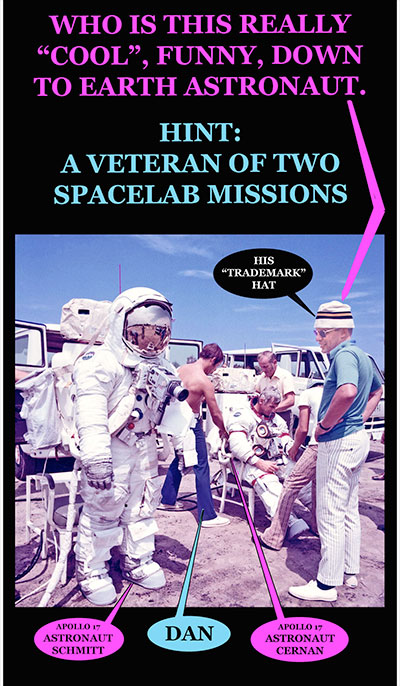 |
J.L
Member Posts: 694
From: Bloomington, Illinois, USA
Registered: May 2005
|
 posted 08-06-2016 01:51 PM
posted 08-06-2016 01:51 PM
   
Dr. Parker. |
Daniel on the Moon
Member Posts: 354
From: Bronxville, NY
Registered: Jun 2015
|
 posted 08-06-2016 03:08 PM
posted 08-06-2016 03:08 PM
   
You are absolutely correct. Astronaut Robert Parker was a member of the support crew for both Apollo 15 and 17. In the photo, he is carrying out his duties as Apollo 17 support crew team member. |
Daniel on the Moon
Member Posts: 354
From: Bronxville, NY
Registered: Jun 2015
|
 posted 08-06-2016 03:28 PM
posted 08-06-2016 03:28 PM
   
quote:
Originally posted by LM-12:
Which MOCR console in Houston monitored the EMU during the moonwalks, and who was on that console for the Apollo 11 EVA?
Console #15 was responsible for monitoring the EMU. Console 15 was called the Telemetry, Electrical, EVA Mobility Unit (TELMU) monitor. I do not know who was monitoring the console for Apollo 11. I do know that there were system specialists in rooms adjoining the MOCR called Staff Support Rooms (SSR) that contained consoles manned by systems specialists who assisted specific MOCR positions. From the real-time data available on their consoles, SSR personnel performed data analyses, analyzed long-term performance trends, compared these trends with base-line data, and relayed this information with recommendations to their respective MOCR leader, in this case the TELMU monitor. I do not know the name(s) of the individuals at the EMU data support monitors. I will venture a guess that Astronaut Ken Mattingly, the NASA EMU expert, might have been at one of the SSR consoles. |
Daniel on the Moon
Member Posts: 354
From: Bronxville, NY
Registered: Jun 2015
|
 posted 08-08-2016 12:06 AM
posted 08-08-2016 12:06 AM
   
The Lunar Extravehicular Visor Assembly (LEVA) with its Sun Visor, Side Eye Shades, Center Eye Shade and Viewport Door all in their Lunar Surface EVA respective open positions was and always will be my all time first choice "symbolic" representation of the Apollo Program.The many times I was looking outside from the inside of the Pressure Helmet Assembly (PHA) through the LEVA Protective Visor and Sun Visor I was nothing less than euphoric. I recall the time I was going through a suited procedure with my LEVA in place and the Sun Visor Down. There was a full length mirror propped up against a table. I snuck a peek and when I saw the "gold" reflection of my LEVA Sun Visor, I felt "inspirational chills" that many of us have experienced. I will never forget that moment. For those of you that are not entirely familiar with the LEVA and its sub-components,I've put together the below graphic. Following is a detailed description of the LEVA components shown below. The PROTECTIVE VISOR is an ultraviolet stabilized polycarbonate shield which affords impact, micrometeoroid, and ultraviolet ray protection. It can be positioned anywhere between the full-Up and full-Down positions and requires a force of 2 to 4 pounds for movement. The protective visor can be lowered independently of the sun visor, but cannot be raised independently with the sun visor in the Down position. The inner surface of the polysulfone SUN VISOR has a gold coating which provides protection against light and reduces heat gain within the helmet. The visor can be positioned anywhere between the full-Up and full-Down positions by exerting a force of 2 to 4 pounds on the pull tabs. The sun visor cannot be independently lowered unless the protective visor is in the Down position, but it can be raised or lowered independently when the center eyeshade is in the full-Up position and the protective visor is in the Down position. The eyeshade assemblies are constructed of fiberglass and are coated with white epoxy paint on the outer surfaces. The inner surfaces are coated with black epoxy paint. The SIDE EYESHADES can be lowered independently of the sun visor and each other to prevent light penetration of the side viewing areas, thereby reducing low-angle solar glare. The CENTER EYSHADE is attached to the LEVA shell assembly over the shell thermal cover and can be lowered independently of the side eyeshade assemblies. The center eyeshade assembly cannot be independently lowered unless the protective visor and the sun visor are in the down positions. When sufficiently lowered, the VIEWPORT DOOR may be positioned as required to reduce solar glare. 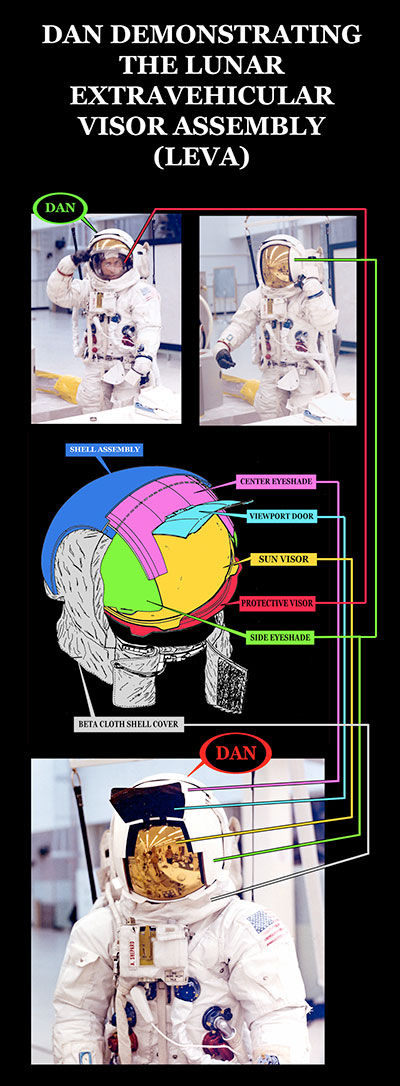 |
LM-12
Member Posts: 4021
From: Ontario, Canada
Registered: Oct 2010
|
 posted 08-08-2016 12:22 AM
posted 08-08-2016 12:22 AM
  
quote:
Originally posted by Daniel on the Moon:
To my knowledge, there were no contingency EVA transfer plans other than for a "soft dock."
Dan, I stumbled across this Final EVA Procedures Apollo 11 document that includes several contingency EVA transfer scenarios (docked/undocked, stable/unstable) using various OPS/PLSS combinations.Here is the procedure for the EVT (undocked, unstable) 2-OPS scenario: - CSM maneuver to LM
- CDR egress feet first, move to EVA handrail clear of hatch; LMP tend lifeline
- LMP egress, move up EVA handrail
- CDR and LMP push away from LM at same time (give signal, pull in, push off)
- CSM maneuver apex to CDR and LMP
- CDR and LMP use handholds to move to side hatch
- CDR ingress CSM, head first, face to MDC, and move to LEB; retrieve CO2 hoses and comm umbilical
- CMP connect C comm umbilical to CDR
- CDR configure audio panel as desired; secure position in LEB and tend lifeline for LMP; LMP ingress CSM feet first, face down, and assume position for closing side hatch
Apparently, the CDR and LMP would have been connected to each other with a lifeline and waist tethers.(Nice LEVA graphic, Dan.) |
Daniel on the Moon
Member Posts: 354
From: Bronxville, NY
Registered: Jun 2015
|
 posted 08-08-2016 01:16 PM
posted 08-08-2016 01:16 PM
   
Great research.Your demonstrated knowledge, love and dedication to the past and future of space exploration lead me to believe that your childhood ambitions included being an Astronaut! |
LM-12
Member Posts: 4021
From: Ontario, Canada
Registered: Oct 2010
|
 posted 08-08-2016 06:34 PM
posted 08-08-2016 06:34 PM
  
Reading here about your experiences brings a lot of us that much closer to knowing what it must have been like back then to be an Apollo astronaut. |
Andy Anderson
Member Posts: 125
From: Perth, Australia
Registered: Dec 2009
|
 posted 08-08-2016 09:46 PM
posted 08-08-2016 09:46 PM
   
quote:
Originally posted by LM-12:
Which MOCR console in Houston monitored the EMU during the moonwalks, and who was on that console for the Apollo 11 EVA?
According to the Manning lists and Page 170 of Rick Houston's/Milt Heflins's book "Go Flight" - for Apollo 11 only, Jim Joki monitored Neil's EMU and Bill Peters did the same for Buzz.They occupied the redundant Booster consoles down on the front row. From Apollo 12 these positions were integrated into the TELMU position in the second row. |
LM-12
Member Posts: 4021
From: Ontario, Canada
Registered: Oct 2010
|
 posted 08-09-2016 10:28 AM
posted 08-09-2016 10:28 AM
  
Thanks for the info, gentlemen.POTW 525 shows the Booster console being used by CMP CapCom Al Worden during the Apollo 12 mission.
|
bklyn55
Member Posts: 390
From: Milford, CT
Registered: Dec 2014
|
 posted 08-09-2016 11:33 AM
posted 08-09-2016 11:33 AM
   
Great narrative and history, keep it up!About a year ago, I bought a piece of Apollo hardware'; "Suit Evaporator (H2O inflow control valve)". All I know about is that it was used to cool or de-humidify the suit while in the Command Module. Can you provide any other information on it? I assume this is an item you would be familiar with. |
Daniel on the Moon
Member Posts: 354
From: Bronxville, NY
Registered: Jun 2015
|
 posted 08-09-2016 05:27 PM
posted 08-09-2016 05:27 PM
   
I don't know any more about it than you. You probably purchased it through a 2014 Heritage Auction. Unfortunately, the item description only focused on sub component part identifications and not its specific function as part of a system.However, you apparently found (in your research) that it is a component in the system that includes dehumidifying the suit. What additional info are you looking for? |
Daniel on the Moon
Member Posts: 354
From: Bronxville, NY
Registered: Jun 2015
|
 posted 08-10-2016 02:44 AM
posted 08-10-2016 02:44 AM
   
I brought my personal camera to an EVA Crew Training exercise with Apollo 17 backup astronauts Young and Duke in the KSC Crew Training Building.During previous crew training runs inside the building, the astronauts complained about the excessively long length of the air supply hoses (see below photos) that connected to the suits through a PLSS mockup shell. On numerous occasions, the astronauts got themselves tangled in the hoses. As a joke, we (the suit techs and I) told Young and Duke that we solved the "long hose problem" and we were ready to demonstrate the solution!. At that point, I had my camera ready and suit tech Troy Stewart proceeded to wrap Duke's air supply hose around him (Photo 3). At the same time, another suit tech wrapped Young's hose around him (Photo 2) as we planned. As expected, we heard "concerned" voices through the portable communications radio, i.e. "What the hell is going on here", "What are you doing with my hose Troy", and some other comments with expletives I would rather not repeat! When we told the crew we were shortening their hoses as they suggested, we all laughed or perhaps only Charlie laughed and John kind of smiled! I was able to get the great photos below. Because I was using my "cheap" camera the photo resolution does not compare to the quality of official NASA photos. 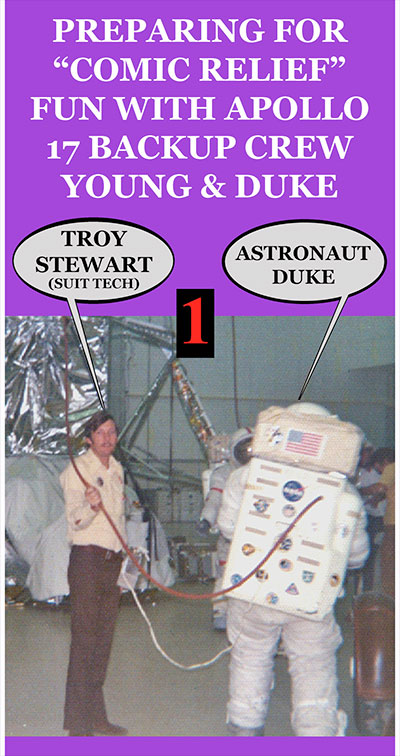 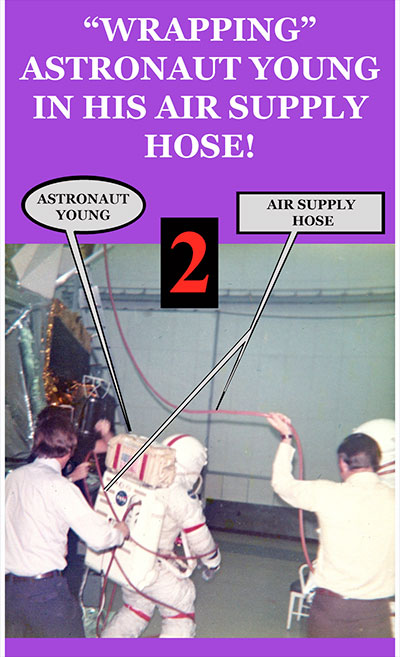
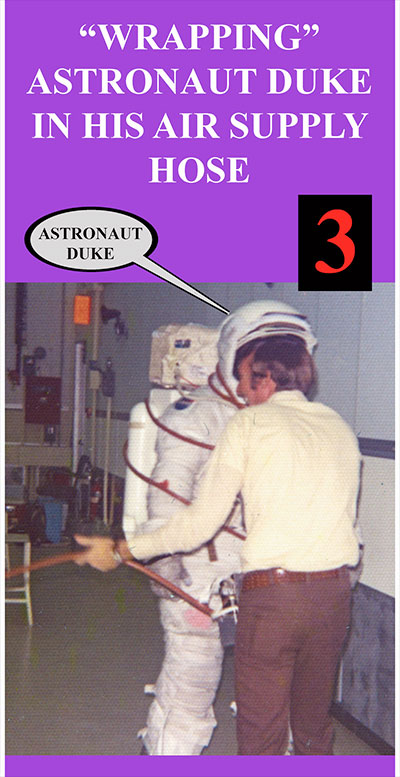
|
MCroft04
Member Posts: 1861
From: Smithfield, Me, USA
Registered: Mar 2005
|
 posted 08-10-2016 04:09 PM
posted 08-10-2016 04:09 PM
   
A great Gotcha! |
DG27
Member Posts: 271
From: USA
Registered: Nov 2010
|
 posted 08-10-2016 04:41 PM
posted 08-10-2016 04:41 PM
   
Hahahah. Dan that is priceless! |
NJ CO
Member Posts: 23
From: Greenwich, NJ, US
Registered: Mar 2008
|
 posted 08-13-2016 04:19 PM
posted 08-13-2016 04:19 PM
  
Just jumping in and once again thanking you for your time and retrospective here, Dan. Quick question, please- do you keep in contact with any of your co-workers, such as Troy Stewart, as pictured in one of your recent posts, for example? Apologies if this has already been asked of you, if so, I must have missed it somehow. |
Daniel on the Moon
Member Posts: 354
From: Bronxville, NY
Registered: Jun 2015
|
 posted 08-13-2016 11:24 PM
posted 08-13-2016 11:24 PM
   
The short answer is no I did not maintain contact with Apollo co-workers and have not kept in contact with astronauts.After Apollo, I accepted a position as Systems Engineer with Martin Marietta in Orlando working on the Sprint anti-ballistic System that would have been used to intercept in-coming Soviet missiles. Soon after, a desire to be my own boss led me to follow the "entrepreneurial bug." I became a 24/7 "workaholic" that, unfortunately, kept me laser focused on nothing but my work. |
Daniel on the Moon
Member Posts: 354
From: Bronxville, NY
Registered: Jun 2015
|
 posted 08-18-2016 12:29 PM
posted 08-18-2016 12:29 PM
   
Yesterday, August 17, 2016 I celebrated my 73rd birthday. My wife and I were sitting on our porch last night starring at a full moon. I said to my wife, "How lucky am I to get the two greatest birthday gifts ever. The first is being blessed with the greatest wife imaginable in this world. The second, being blessed with the sight of a full moon on my birthday." My wife commented that 47 years ago men were walking on that beautiful orange jewel and you Dan helped make it happen. |
Kite
Member Posts: 1163
From: Northampton UK
Registered: Nov 2009
|
 posted 08-18-2016 04:42 PM
posted 08-18-2016 04:42 PM
  
That must be very satisfying Dan. To have taken an important part in Apollo has to be a stupendous achievement and seeing your posts on here is exhilarating to me who remembers those times so well, albeit from this side of the Atlantic. I have a 70th birthday coming up very soon and how quickly those years have flown by but I wouldn't swap our times even if I could.On the first moon landing I was with my fiancée who has now been my wife for over 46 years and we are still very happy. We too have been blessed. |
JohnSpaceUK
Member Posts: 59
From: UK
Registered: Jan 2016
|
 posted 08-19-2016 02:40 AM
posted 08-19-2016 02:40 AM
   
Happy Birthday Dan.Thank you so much for this thread. I'm too young to have witnessed the landings first hand, but your posts are letting me experience it through your excellent informative and funny insights. I cant wait for the next gem! |
NJ CO
Member Posts: 23
From: Greenwich, NJ, US
Registered: Mar 2008
|
 posted 08-19-2016 08:19 AM
posted 08-19-2016 08:19 AM
  
Happy belated birthday, Dan. Fittingly rounded the day off with a full moon. |
Wehaveliftoff
Member Posts: 2343
From:
Registered: Aug 2001
|
 posted 08-21-2016 12:50 AM
posted 08-21-2016 12:50 AM
  
Happy belated birthday to Robert De Niro and Dan, same birth dates! |
ejectr
Member Posts: 2025
From: Killingly, CT
Registered: Mar 2002
|
 posted 08-21-2016 09:29 AM
posted 08-21-2016 09:29 AM
   
Happy birthday, Dan. Looking back at your life must give you great pleasure of intense accomplishment. Looking ahead, may you have many more birthdays to come. |
Daniel on the Moon
Member Posts: 354
From: Bronxville, NY
Registered: Jun 2015
|
 posted 08-22-2016 11:35 PM
posted 08-22-2016 11:35 PM
   
The below graphic is a great visual example of the Apollo "Quality Control" Paperwork Trail - a major contribution to the success of the Apollo Program.The photo below shows Apollo 13 Astronaut Fred Haises flight PLSS and OPS prepared for a pre-flight inspection test procedure. The "Test Preparation Sheet" (TPS) was written to authorize the testing including the removal of the hardware from bonded storage and transfer to the test area (in this case the crew training building). The "Test and Checkout Procedure" (TCP) was written to include the specific procedures to conduct the test. Other paperwork includes: - "Interim Discrepancy Reports" (IDR).
If, during the execution of testing, there was an un-diagnosed issue, an "Interim Discrepancy Report" (IDR) was written and logged in a "Test And Inspection Record" without stopping the test. Following the completion of the test, the IDR would be further investigated and dispositioned as either resolved or up-graded to a "Discrepancy Report" (DR). - "Discrepancy Reports" (DR).
A DR was written by the contractor QC inspector for any out of specification test result. DRs remained open until they were dis-positioned and signed by the test engineer and a NASA contractor engineer liaison that was permanently assigned to the contractor. - "Material Review Board" results if a DR is unresolved.
- "Hardware Functional Test Reports" and other misc. paperwork.
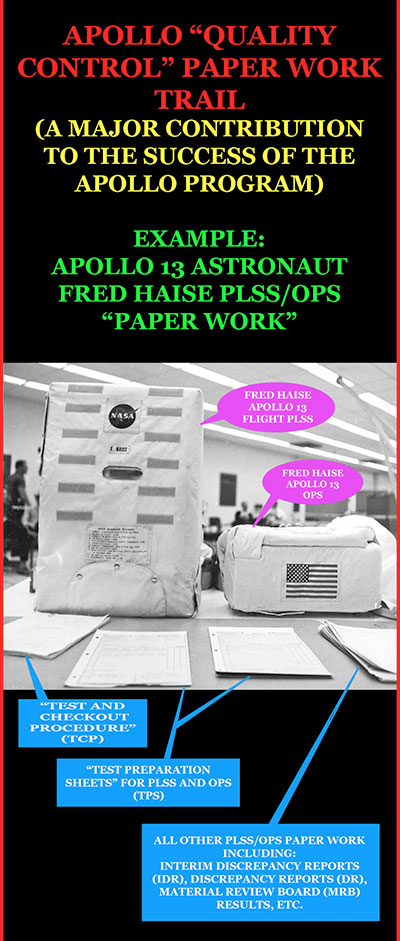 |
Daniel on the Moon
Member Posts: 354
From: Bronxville, NY
Registered: Jun 2015
|
 posted 08-30-2016 12:05 AM
posted 08-30-2016 12:05 AM
   
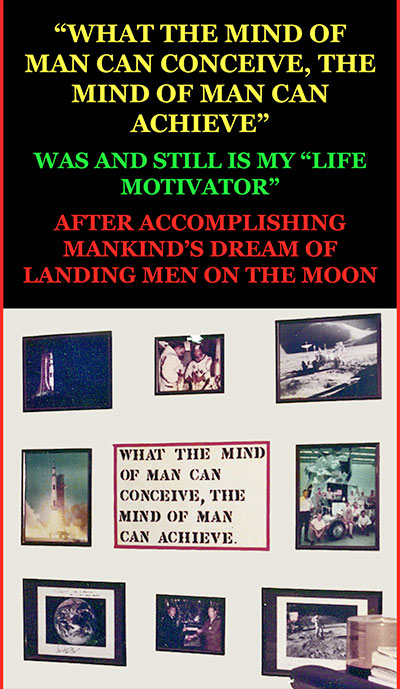 |
Daniel on the Moon
Member Posts: 354
From: Bronxville, NY
Registered: Jun 2015
|
 posted 08-31-2016 12:08 AM
posted 08-31-2016 12:08 AM
   
How many of you are under the impression that EVA "training" PLSSs and OPSs were flight configured units that were downgraded (Class 111) for EVA crew training? |
ejectr
Member Posts: 2025
From: Killingly, CT
Registered: Mar 2002
|
 posted 08-31-2016 01:26 PM
posted 08-31-2016 01:26 PM
   
I for one thought that... |
Daniel on the Moon
Member Posts: 354
From: Bronxville, NY
Registered: Jun 2015
|
 posted 08-31-2016 06:04 PM
posted 08-31-2016 06:04 PM
   
Thank you for responding to my question. I'm going to assume that many cS members are also under the impression that training PLSS/OPSs were downgraded flight units.Based on my assumption, I plan on posting my experiences (as PLSS/OPS EVA Crew Training Mission Manager) pertaining to the equipment used, the problems associated with the equipment used and the changes made to solve problems so that we never missed a planned crew training exercise as a result of equipment and associated problems. My story will be relevant for historians that look back and want to know how Apollo mission EVA Training was accomplished as there is very little documented information since I was totally responsible for the PLSS/OPS training hardware used. For those of you who assumed that training PLSS/OPSs were functionally equivalent to flight hardware and therefore could be used for earth training, the flight PLSS ventilation cooling and LCG water cooling capability was based on the process of sublimation (a solid [ice] converted directly to a gas without passing through the liquid phase) that required the vacuum of space. Watch this "space" (no pun intended)! |

























